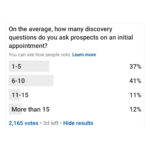A few weeks ago, I attended a sales conference in Las Vegas that was a real eye-opener. Not because I saw revolutionary stuff (other than an AI app that I’m continuing to research), but because what I saw was pretty retrograde. The keynote speaker gave us the mind-blowing revelation that we should….wait for it…ASK QUESTIONS before giving a rehearsed pitch!
I’ve been saying for 25 years that, in sales, our success hinges on understanding our customers’ needs. In fact, 80% of our chances to win the sale hinge on the questions that we ask. Yet, too often, salespeople fall into the trap of asking leading questions that serve their own agenda rather than their customers’. Honestly, I can’t blame the salespeople – many of the sales trainers that I saw in Vegas were still preaching the “don’t ask a question that you don’t know the answer to” nonsense. This approach not only fails to uncover valuable insights but can also breed suspicion and distrust. I don’t have to tell you that suspicion and distrust are the enemy of good selling.
The key to meaningful customer engagement lies in mastering the art of open-ended questions. And when I say “open-ended,” I mean more than just “questions that can’t be answered by yes or no.” I mean “questions that create an open and honest forum for dialogue – even if those answers might harm my chances of making a sale.” These queries invite customers to share their thoughts, challenges, and aspirations freely. By asking “What are your main business challenges?” instead of “Don’t you struggle with X?”, we create an opportunity for genuine discovery. Remember – the Investigation phase of the Buyer’s Journey is all about genuinely uncovering what the customer is dissatisfied with, where they want to be, and how we can get them there.
Open-ended questions:
- Demonstrate genuine interest in the customer’s business – what makes them tick, why their customers buy from them, and what help they are seeking.
- Reveal unexpected pain points and opportunities – sometimes even the customer doesn’t know what they’re looking for until great questioning uncovers it.
- Build trust through active listening – which is why you should have your main questions planned out BEFORE you meet with the customer. That’s a basic aspect of having your act together as a professional salesperson.
- Allow customers to feel heard and valued – which is more difficult nowadays with as much impersonal communication as we have – and it makes the idea that a genuine person is truly hearing you and valuing the words coming from your mouth all that much more important.
- Provide a road map for tailoring solutions – the “one size fits all” rehearsed presentation doesn’t work anymore, if it ever did. When the sale comes down to a selling contest, the salesperson who knows their customer the best nearly always wins. If that’s not you – then you’re probably going to lose.
So why don’t salespeople ask more open-ended questions and give their customers an open forum? Well, a couple of reasons. First of all, it’s perceived as risky. When you allow your customer an open forum, rather than attempting to direct or lead them, they might say something that disqualifies them as a prospective customer for you, or you as a prospective vendor for them. I’m 100% fine with both of those issues. If you’re going to lose the sale, it’s better to lose early and move on to someone else. Plus, being honest with the customer and telling them that you’re not a fit preserves your credibility for the future. I’ve said it before and I’ll say it again – some of my best customer relationships have started with a lost sale.
The second reason is simpler. Salespeople are in a hurry to get to their pitch, because they think that the sooner they pitch, the sooner the close happens. That’s not always the case, as I discussed last week.
Remember, selling isn’t about pushing products—it’s about solving problems. By approaching each interaction with curiosity and a desire to learn, we position ourselves as trusted advisors rather than mere vendors.
Challenge yourself: Every week, try to come up with at least one new open-ended question to ask your customers. It’s a great thought exercise. You’ll definitely come up with some questions that don’t work, but you’ll also come up with some that do, which makes it worth the effort. You might be surprised by what you learn—and how it builds stronger relationships with customers.


 Are you asking enough questions? A couple of weeks ago, I ran a poll on a very popular LinkedIn group. The poll question was simple: “On the average, how many discovery questions do you ask a new customer on an initial appointment?” If you’ve read any of my work at all, you know that I believe that the root of good things in selling is asking a lot of good questions; in fact, questioning is the longest unit in
Are you asking enough questions? A couple of weeks ago, I ran a poll on a very popular LinkedIn group. The poll question was simple: “On the average, how many discovery questions do you ask a new customer on an initial appointment?” If you’ve read any of my work at all, you know that I believe that the root of good things in selling is asking a lot of good questions; in fact, questioning is the longest unit in